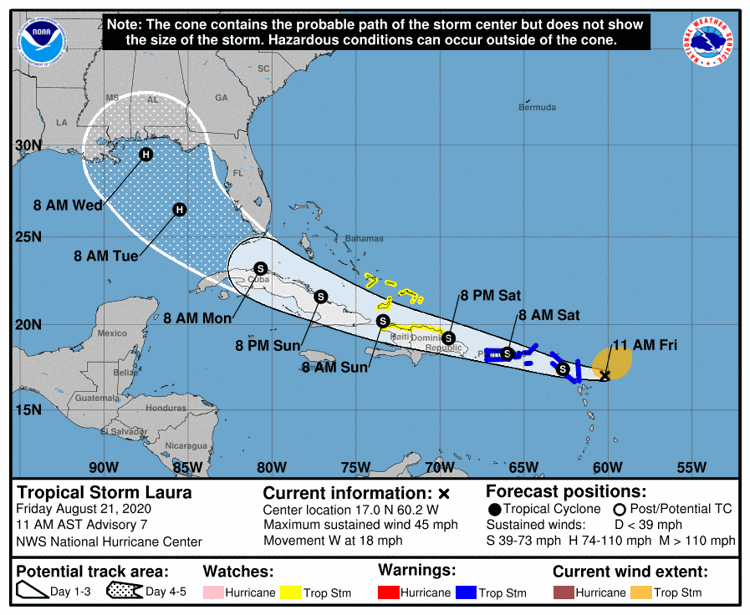As Tropical Storm Laura approaches Florida, residents should take steps to prepare for hurricane conditions, including heavy rains, flooding, and high winds.
Experts are predicting that this storm will become a named hurricane as it moves closer to Florida. The attorneys at Nutter Law Group encourage you to view our helpful website Nutterlawgroup.com for resources and services.
Nutter Law Group has developed a practice geared towards assisting homeowner’s both prior to, and following, a hurricane loss. Please review the information below in preparation for hurricane season.
WHAT TO DO BEFORE A HURRICANE:
- Understand the category and strength of the storm – Hurricane strength is classified by category (1-5). Lower-category (1 or 2) hurricanes can be minimally damaging, while others, like a category 3, 4, or 5, have the potential to cause catastrophic damage. It is important to understand the strength of the storm as it approaches the coast to ensure that you are taking appropriate measures to prepare yourself and your home. For example, for a hurricane with a lower classification, securing debris and loose items from around your home may be sufficient, while appropriate measures for a higher category hurricane may involve installing storm shutters, taping down furniture, and vacating the home.
- Turn off gas, water, and electric breakers – Utilities can be damaged during a hurricane event, and it is best to shut off these utilities prior to a storm. However, make sure to leave your air conditioning running during a hurricane event to prevent increased humidity, and possible mold growth, in the event water penetrates your home during the storm.
- Have sandbags filled and placed against any openings (doors, garage, etc.) on or near the ground level. This will help prevent any surface or flood waters from entering the home.
- Make sure windows and doors are properly covered and protected. If your home is equipped with storm shutters and doors, use them. Otherwise, consider using plywood to board up the windows and any glass doors or openings.
- Trim trees surrounding your home. The loosest branches will be the first to break loose from trees, and these can become projectiles that can cause serious damage to the home.
- Clear any clogged rain gutters and down spouts.
- Secure any patio furniture or items that my blow away, or move these items inside the home or garage.
- Reinforce the garage door – heavy winds can compromise the integrity of your garage door, allowing significant water intrusion and wind damage to anything inside of the garage.
- Take photos of all items of value – in the event valuable items are damaged or possibly looted following a storm, it will help to have photographic proof of the existence and condition of these items prior to a hurricane event.
- Prepare a safe or weather-proof folder containing important documents, including: driver’s licenses, passports, identification cards, birth certificates, prescriptions and medical records, insurance policies and cards.
- Make sure you have spending cash on hand in the event certain establishments may not have the capability to process credit or debit cards immediately following a storm.
In addition, the Red Cross recommends having the following supplies on hand in advance of a hurricane impact:
- Water: At least a 3-day supply; one gallon per person per day
- Food: At least a 3-day supply of non-perishable, easy-to-prepare food
- Flashlight
- Battery-powered or hand-crank radio (NOAA Weather Radio, if possible)
- Extra batteries
- First aid kit
- Medications (7-day supply) and medical items (hearing aids with extra batteries, glasses, contact lenses, syringes, cane)
- Multi-purpose tool
- Copies of personal documents (insurance policies, birth certificates, lease or deed to home)
- Sanitation and personal hygiene items
- Emergency blanket
- Insect repellent and sunscreens
- Baby supplies (bottles, formula, baby food, diapers)
- Rain gear
WHAT TO DO AFTER A HURRICANE:
- Report the claim to your insurance company as soon as possible – it is often first come, first served as it relates to an insurance claim. In addition, your policy requires you to promptly notify the insurance company of a loss.
- Request a copy of the insurance policy from the insurance company – it is important to have a complete copy of your policy to understand the coverages that are available. For instance, in addition to coverage for your property damage, your policy also likely covers temporary living expenses in the event you are forced to vacate your home as a result of hurricane damage.
- Protect the property from further damage – this may involve boarding up broken windows, placing a tarp over openings in your roof or walls, and other steps to mitigate or prevent additional damage.
- Leave your air conditioning unit running – if your home has sustained water intrusion, rapid mold growth can occur, particularly if the temperature inside the home rises as a result of the air conditioning unit being shut off.
- Make and keep a record of the loss – this involves photographing and videoing all damage, including damage to the roof, walls, yard, and interior of the building, as well as personal items.
- Prepare a written inventory of all damaged property to accompany the photographs/videos.
- Save all receipts for costs incurred as a result of the hurricane damage.
- Provide all requested information and documentation to the insurance company.
- Use caution before entering into any contract with a repair company, adjuster, or lawyer.
- Consult with a lawyer if your claim is denied, or before accepting any claim payments from your insurance company, particularly if the insurance company is requiring you to sign a release.
If your home was damaged during a hurricane and you have questions or concerns about what your homeowner’s insurance policy will cover or believe that your insurer is operating in bad faith, please contact Nutter Law Group at (813) 575-4442 to schedule a meeting with an experienced Florida hurricane insurance claims lawyer who can evaluate your case. We are prepared to begin assisting you immediately.

